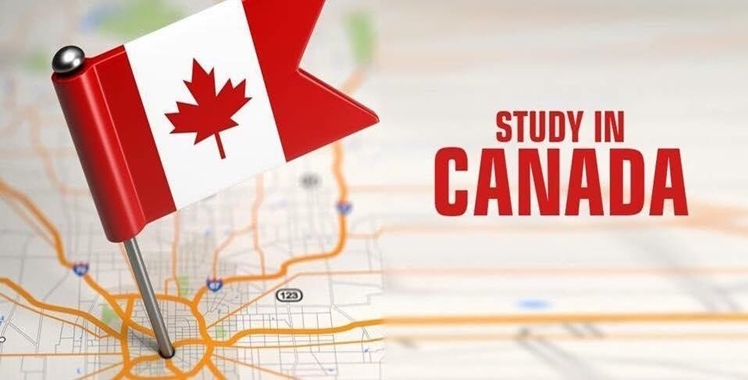
Canada Student Visa Consultant in Ahmedabad
Canada is second largest Country in the World. Highest Industrialized Countries of the world. Canada has ranked 35th in population with 35 million people in the country
Canada has worldwide reputation as quality education as quality education provider.
Canada also has one of the fastest growing economies of the world. Canada ranks among the 10 leading manufacturing nations and has also experienced tremendous growth in the technology and service industries. Canadian degrees and diploma are recognized throughout the world. Canadian work experience is highly desirable by multi – national companies who actively recruit on Canadian campuses.
Canada also has one of the best education systems in the world. Almost 51% of Canadians are college educated and education is compulsory till one is 19 years of age in this country. Moreover, Canada boasts of some of the most influential universities in the world. The programmes offered in most Canadian universities balance practical work and theoretical learning giving a complete hands-on education experience to students. It is also important to note that students who have study in Canada can apply for a permanent residency for Canada without moving out of the country.

Canada Student Visa Criteria for Eligibility:
- In Canada, a designated learning institute (DLI) must accept you.
- You also need to have enough money to cover your living expenses and tuition.
- There must be no criminal activity on your record.
- There must be no health risks.
Why pursue your studies in Canada?
- Superior instruction
- Safe housing atmosphere
- Embracing one's independence when learning
- Excellent quality of life
- A degree that is respected worldwide
- Cost-effectiveness
- Fantastic immigration opportunities
- A wonderful blend of nature, technology, and cultures
- Plenty of options for courses
Canada is quickly rising to the top of the international student preference list. Every year, about 200,000 students travel to Canada to take advantage of its great educational system. It is noteworthy that Canada is the country with the highest per capita spending on education among the Organization for Economic Cooperation and Development member nations. Education degrees from Canadian universities are accepted everywhere in the world.
Many different topics were covered by some well-tailored programs offered by Canadian colleges and education organizations. Although the courses may vary significantly from one institute to the next, they all strive to give students who enrol in them complete assistance as well as unmatched instruction and training. The interesting little statistic that most students find most appealing is that 90% of Canadian institute graduates find employment in their areas within six months of graduation.
Education System
When it comes to the amount of money spent per person on post-secondary education, Canada leads the pack. Three divisions make up the Canadian educational system: elementary, secondary, and post-secondary. In Canada, there isn't a true federal education system. The provinces and territories in this nation are in charge of education. Canada is a country that values education so highly that public education is free up to secondary school.
Universities or community colleges offer post-secondary education. The following brackets represent the division of education institutions in the post-secondary sector:
- Certificate – These courses run for around a year.
- Diploma – These programs last for two years.
- Advanced Diploma – A three-year curriculum that can lead to a bachelor's degree.
- Post Graduate Diplomas/Certificates – These courses serve as a springboard for master's degrees and typically run between 12 to 17 weeks. They offer both academic and practical study, and they are occasionally required in order to enrol in a bachelor's program.
- Bachelor’s Degree – Awarded by universities, colleges, and community colleges following a four-year academic program; often, graduate-level coursework follows.
- Master’s Degree – Graduates typically pursue master's degrees in order to broaden their career options after graduation by continuing their education and conducting research in their profession. These two-year degrees are typically earned following a three- or four-year bachelor's program.
- Doctorate or PhD – It typically takes four to seven years to complete, placing it above master's degree programs.
Students have plenty of opportunity to widen their perspectives in their study thanks to these courses offered by Canada's numerous colleges, universities, and educational institutions. The degrees earned here are regarded as being on par with those from colleges in the US and other Commonwealth nations.
Application Process:
A student should begin preparing for studying in Canada at least a year in advance. In September or the fall, Canadian educational institutions often take in a large class. There is also another intake in January for the winter semester, but it usually depends on the student's application and the degree they choose. A small number of institutes additionally offer a May intake.
English proficiency is a significant requirement for applying to Canadian educational institutions. Exams such as the TOEFL or IELTS are mandatory for all international students. For undergraduate programs, an IELTS score of 6.0 to 6.5 is necessary; for postgraduate programs, a score of 6.5 to 7.0. For undergraduate programs, a TOEFL score of 80 or higher is required; for postgraduate programs, a score of 90 or higher.
Students enrolled in advanced diploma, diploma, or certificate programs often need to have completed their HSC exams with a higher second class. While postgraduate certificates or diplomas require an upper second class in a bachelor course completed three or four years prior, bachelor degrees require a first class in HSC examinations. If the course is four years long, a first class bachelor's degree is often required for a master's degree. A master's degree must be completed in one year if the course is three years long.
Study Permit:
Anyone who want to study in Canada must obtain a study permit. During your stay, this study permit serves as a student visa. You do not require a student visa for courses shorter than six months; however, those longer than that call for one. However, applying for a student visa at the outset can be a smart option if you intend to continue your education after those six months.
You can extend your Canadian study permit while you're still in the country. You can work part-time on campus with this type of work permit as well. As part of your curriculum, it can also enable you to work off-campus or as an intern. It is noteworthy that the processing time for online student visa applications is twice that of paper applications.
A police clearance certificate and a health check-up are required for visa applications. Student visa deadlines are very stringent and may require you to have all of your documentation ready in advance. In fact, deadlines are strict for all types of visas. Proof of finances is also required of international students. The required amount for a year's stay in Canada is $10,000 Canadian dollars, and these funds must be in your name. Instead of ten thousand, Quebec demands proof of money in the amount of eleven thousand.

